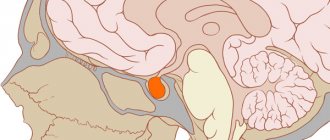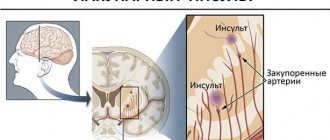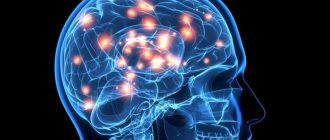For many people, old age is a difficult period of life, during which a decrease in physical functions and serious mental changes occur. In older people, their social circles become smaller, their health deteriorates, and their thinking abilities and concentration weaken. The person feels helpless. People are susceptible to mental illnesses, most of which are senile psychoses.
In medicine, psychosis is understood as a severe mental disorder in which behavioral and mental reactions do not correspond to the real state of affairs.
In the Ultramed private clinic, highly qualified specialists have been successfully treating the disease for 20 years using proven, certified drugs and techniques. We are ready to provide effective treatment for psychosis anonymously and at a reasonable price.
Causes of diseases in old age
- Genetic predisposition;
- Atherosclerosis of cerebral vessels, hypertension, hypotension, diabetes mellitus in an advanced stage;
- Abuse of sleeping pills, drops containing alcohol, alcoholic beverages, psychoactive substances;
- A sharp change in the usual way of life;
- Exacerbation of chronic somatic disease or acute inflammation.
- Alzheimer's disease.
- Aging of the body.
During the period of exacerbation of these diseases, signs appear that may be symptoms of the development of psychosis.
Risk factors for the disease are:
- Sleep disturbances;
- Surgical interventions;
- Acute vitamin deficiency;
- Diseases of the organs of hearing or vision;
- Constant state of stress;
- Social isolation, loneliness, especially depression
- Traumatic brain injuries;
- Neoplasms in the brain.
Alarm bells
It is believed that women are more susceptible to insanity than men. It does not matter what type of activity - mental or physical - the patient has been engaged in throughout his life. Delusional disorders spare no one.
Anna Afanasyevna T. worked in the library, in the scientific literature department, for 42 years. Among all her acquaintances, she was known as a very intelligent, educated and erudite person. Therefore, the relatives, to put it mildly, were extremely surprised when they found Anna Afanasyevna near the trash can. Enthusiastically rummaging through the container, she claimed that she must find a book about Ivan the Terrible for a friend of hers, an associate professor from the history department. When they took her home, she was sincerely perplexed and cried that she was letting a good man down and would definitely continue her search tomorrow...
One of the first symptoms of the disorder is a change in the character of an elderly person, and always not for the better. The patient becomes suspicious, secretive, capricious. He begins to blame loved ones for not paying enough attention to him, and in moments of close communication, on the contrary, he withdraws into himself and remains silent. Jealousy and unreasonable fears may appear. The patient fears that he will be killed, kidnapped, or his money stolen. At the same time, he easily makes contact with strangers and complains about relatives.
Hallucinations, voices in the head, obsessions are also manifestations of insanity. Unfortunately, it is not always possible to recognize the first symptoms immediately, and relatives turn to the doctor already in the acute stage of the disease, when irreversible processes have begun to occur in the brain.
Forms of senile psychosis and their causes and symptoms
Acute form
- Vitamin deficiency in the diet;
- Hearing impairment;
- Physical inactivity;
- Upper respiratory tract diseases;
- Lack of sleep.
The pathology develops gradually and shows signs of progression. Most often, the developing disease manifests itself as attacks of depression and apathy. The disease can be avoided in 90% of cases if you notice its symptoms in time and seek qualified help.
Signs of the onset of acute senile psychosis
Before the obvious manifestation of pathology, it is preceded by a prodromal stage, which lasts for 1–3 days and is manifested by the following signs:
- Sudden onset of weakness;
- Problems with self-care;
- Disorientation in space;
- Decreased appetite and eating disorders;
- Disruption of sleep patterns or reduction in its quality.
- Severity of confusion.
- Visual hallucinations
Inaction in the presence of these symptoms almost always leads to the onset of acute psychosis.
Symptoms
- The appearance of increased motor activity;
- Unreasonable anxiety and restlessness;
- The need to go somewhere and do something;
- Confusion of thinking;
- Unclear formulation of requests and demands;
- The emergence of delusional thoughts and ideas;
- The appearance of unjustified aggression;
- The patient’s confidence that others want to harm him;
- The patient experiences a feeling of meaninglessness in life.
- Hallucinations;
- Exacerbation of somatic diseases.
- Dementia.
Acute psychosis manifests itself over 2-3 weeks, during which time a person’s behavior can be stable, without any significant changes, or it can be accompanied by regular exacerbations and outbursts. In between, the patient is in a deeply depressed and apathetic state.
How does psychosis manifest in the elderly?
Senile psychotic disorders identified by specialists at our health center are divided into several types. They can occur in isolation, with periodic attenuation and new exacerbations. Sometimes one set of symptoms is reduced to another. There are also isolated mental disorders that go into stable remission, which is an indicator of their effective cure. Let's consider the main symptom complexes.
Acute forms of senile psychoses
These are the problems our psychiatrists most often have to deal with.
Their development is caused by somatic ailments:
- Cardiovascular and respiratory failure.
- Hypovitaminosis.
- Diseases of the kidneys and liver.
Patients exhibit characteristic disorders:
Partial or complete disorientation in space and time with confusion.- Motor restlessness.
- Anxiety.
- Transient hallucinatory visions.
- Crazy statements.
The duration of symptoms is several days, less often weeks. After the end of the attack, prolonged asthenia and mild lethargy remain. The episode may be repeated.
Chronic senile depression
The severity of clinical manifestations of this form depends on the age of the patients (usually women).
The psychotic reaction consists of:
- Apato-adynamic complex.
- “Silent” depression, in which few people pay attention to the emerging symptoms. And this kind of patient is prone to suicide, which is a complete surprise to others.
- Hypochondriacal complaints with ideas of self-accusation, up to Cotard's delirium.
This senile psychosis lasts a long time - 10 or more years. Thanks to successful therapy in our clinic, it is possible to significantly mitigate its course. Intellect in this form practically does not suffer, only memory problems appear over time.
Chronic paranoid psychoses
The main manifestation of the disorder is the patient’s delusional ideas, with fear of harm from loved ones.
They believe that relatives or neighbors want:
- Bring their death closer.
- Poison.
- Kick out of the home.
- Rob.
Patients turn to various authorities for “protection”, initiate checks, etc. This kind of client retains complete social adaptation, and their nonsense is perceived by department officials as the truth until the circumstances are fully clarified.
Hallucinosis
Characteristic of old age (after 80 years).
Manifest:
- Vivid visual, tactile and auditory hallucinations.
- Severe memory impairment.
- Dermatous delirium. A person is sure that he has parasites and foreign objects on his skin that he cannot get rid of. The patient itches, brushes off non-existent objects, consults dermatologists, and constantly washes clothes and bed linen.
Hallucinatory-paranoid form
This option is characterized by:
- Delirium of damage.
- By adding hallucinations of fantastic content.
- Echo thoughts with hearing voices (schizophrenia-like course).
- False ideas.
This type of disease occurs continuously with slow progression, leading to gradual memory loss.
Senile paraphrenia
Psychotic disorder is manifested by false memories with fantasizing. Patients talk about incredible events, meetings, acquaintances that had no place in their lives. Patients often develop euphoria and delusions of grandeur. The painful episode lasts 3-4 years, then begins to gradually fade.
Chronic form of senile psychosis
Women are most susceptible to this form of the disease. Symptoms of chronic senile psychosis:
- Depressive state;
- Apathy, indifference to the world around us, awareness of the futility of everything that happens;
- Feeling of hopelessness;
- Increased anxiety;
- Aggression;
- Self-flagellation;
- Short-term memory loss.
The chronic form of the disease can last from 12 to 17 years.
Mental illnesses caused by chronic psychosis
Chronic psychosis can manifest itself through various mental illnesses:
- Paranoid state is an aggravated mental state of a person, accompanied by symptoms:
- Chronic delusions directed at one’s own environment. The patient may be convinced that everyone wants to harm him or even kill him.
- Anxiety for the safety of things and property and the desire to protect them from the influence of others.
This condition can accompany the patient for an unlimited amount of time.
2. Hallucinosis is a psychotypical disorder with preservation of mental clarity, which is accompanied by:
- Illusions and sensations arise that are caused by various receptors. Thus, the patient may hear non-existent voices that carry a semantic load - they threaten or insult the patient. An elderly person may see planar hallucinations in the form of pictures, which become more numerous, bright and voluminous as the disease progresses.
- Increased anxiety.
- Increased physical activity is observed.
- Aggressiveness.
- Carrying out instructions for non-existent people. The patient can enter into dialogue with invisible characters and perform actions under their influence. In this case, the patient most often realizes that the events happening to him are unreal.
- Tactile hallucinations, which manifest themselves as burning and itching of the skin, similar to small insect bites.
3. Hallucinatory-paranoid state.
This manifestation of chronic psychosis combines visual hallucinations with delusional thoughts and ideas and is considered a more complex form of the disease. The clinical picture of this condition is very similar to schizophrenia. The disease is accompanied by slow memory loss. It is very difficult to make a correct diagnosis in a timely manner in this case.
4. Senile paraphrenia. It is characterized by the fact that the patient rethinks himself completely. For example, he can pretend to be another person, attribute unusual actions and actions to himself. The form and content of such manifestations are usually stable. The disease begins to develop no earlier than 70 years of age.
Over time, the psyche of most people is susceptible to irreversible changes. But critical deviations and disorders can cause discomfort to both the patient and his loved ones. Mental disorders entail problems related to a person’s physical health. If you detect initial signs of any form of disorder, you should immediately consult a doctor.
What to do if an elderly person speaks nonsense
In situations where your loved ones have inappropriate statements or strange behavior, you should contact our specialist as soon as possible.
This requires:
- Dial our mental health center hotline number.
- Describe the problem to the dispatcher in detail.
- Provide the necessary information about the patient.
- Make a decision: call a psychiatrist to your home, or take the person in need of help to a hospital.
- Place a call.
If you call a doctor and it turns out that hospitalization is still necessary, then in such cases we provide a transfer service. Transportation may also be necessary in the presence of delirium in elderly bedridden people. The client is transported accompanied by a medical professional.
Any type of request to us for help is anonymous. You can call the call center at any time of the day. If an emergency occurs on holidays or weekends, then do not wait for them to end, call us, we work every day.
Diagnosis of senile psychosis
Since the disease develops very slowly and can remain undetected for a long time, regular examination is necessary after reaching the age of 60 years. The goal of preventive measures is to exclude organic pathologies of the brain, which is done by a therapist, cardiologist, endocrinologist and neurologist. Specialists prescribe examinations:
- MRI of the head;
- X-ray of the skull;
- Electroencephalogram;
- ECG of the heart.
In most cases, senile psychosis has obvious manifestations in an advanced stage when the participation of a psychotherapist cannot be avoided.
Treatment methods for senile psychosis
Treatment includes medications and psychotherapeutic methods. The choice depends on the severity of the condition, the type of disorder and the presence of somatic diseases.
Medication
Consists in the use of the following groups of drugs:
1. Neuroleptics - reduce excessive transmission of nerve impulses, soften delusional, hallucinogenic and depressive states of the patient:
- Aminosine;
- Sonapax;
- Eglonil.
2. Antidepressants - help get rid of depression by increasing the amount of adrenaline and improving mood. Popular drugs in this group:
- Melipramine;
- Amitriptyline;
- Fluoxetine.
3. Sleeping pills - help make it easier to fall asleep and also ensure long-lasting deep sleep.
- Phenozepam;
- Phenobarbital;
- Melatonin.
The specialist prescribes combination drug therapy, selecting drugs depending on the symptoms of psychosis.
In parallel, it is necessary to treat a somatic disease if it is the cause of the disorder.
Psychotherapeutic
The method involves the patient working with a psychotherapist. The psychotherapeutic method perfectly corrects senile psychoses and gives a positive result in combination with drug therapy.
Specialists conduct mainly group classes. In such conditions, patients find a new social circle, united by common interests. A person can begin to openly talk and get rid of his problems, worries and fears in a circle of like-minded people.
The most effective methods of psychotherapy are:
- Occupational therapy. Usually after retirement a person feels unclaimed. Therefore, older people are offered to engage in feasible physical or intellectual activities that will help them calm down and take their minds off painful thoughts.
- Discussion technique. It is a discussion of the most pressing issues of old age and the difficulties of social relationships.
- Art therapy. During classes, patients draw and make crafts. It brings people together and gives them the opportunity to express themselves.
- Color therapy. The influence of light on the human psyche has long been proven. Red excites, green calms.
- Reading therapy. The doctor selects appropriate books for the patient that have the necessary subtext. The patient's task is to read these books and make notes. Then there is a joint analysis and discussion of what has been read.
Senile psychoses cause inconvenience not only to the patient himself, but also to the people around him. For a favorable prognosis, it is necessary to seek correct treatment in time.
Why does delirium develop in an elderly person?
Involutional processes caused by age most strongly affect brain functions. In connection with these changes, the activity of the central nervous system follows the path of simplification, reverse development, only with pronounced dynamics. The first signs of involution are observed in almost any person who has crossed the forty-five-year mark. And after 60, mental regression manifests itself with obvious signs, expressed to varying degrees.
If you pay attention to emerging deviations in a timely manner, they can be significantly stopped. Therefore, any person who has lived to old age must take independent steps to prevent the appearance of senile ailments. Timely provision of advisory assistance and implementation of medical recommendations will help maintain mental adequacy longer and avoid the development of pathology accompanied by delusional states.
Benefits of treating older adults in a medical setting
- Qualified specialists with extensive experience;
- Proven effective techniques and high-quality care are used;
- Modern diagnostic methods that allow timely detection of pathology;
- Patients are under 24-hour supervision;
- We maintain contact with the patient’s relatives and provide them with psychological assistance;
- If necessary, we are ready to deliver the patient to our hospital or take him home free of charge.
Articles in the gerontology section:
- Dementia treatment
- Gerontology Clinic
- Gerontology hospital
- Treatment of senile insomnia
- Senility
- Gerontologist (geriatrician)
Forecast and preventive measures
A stay in the hospital of our center with timely assistance provided gives reason to talk about a positive prognosis after treatment of acute conditions. Chronic psychotic forms, unfortunately, have an unfavorable course; doctors can only achieve temporary remission. After discharge, clients, under the supervision of relatives, should follow the recommended regimen, avoid neuropsychic overload, and treat existing pathologies of internal organs. When the first signs of exacerbation appear, simply dial 8(969)060-93-93.











